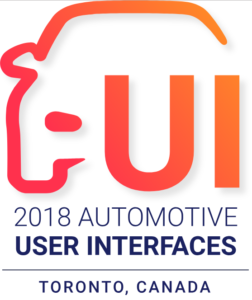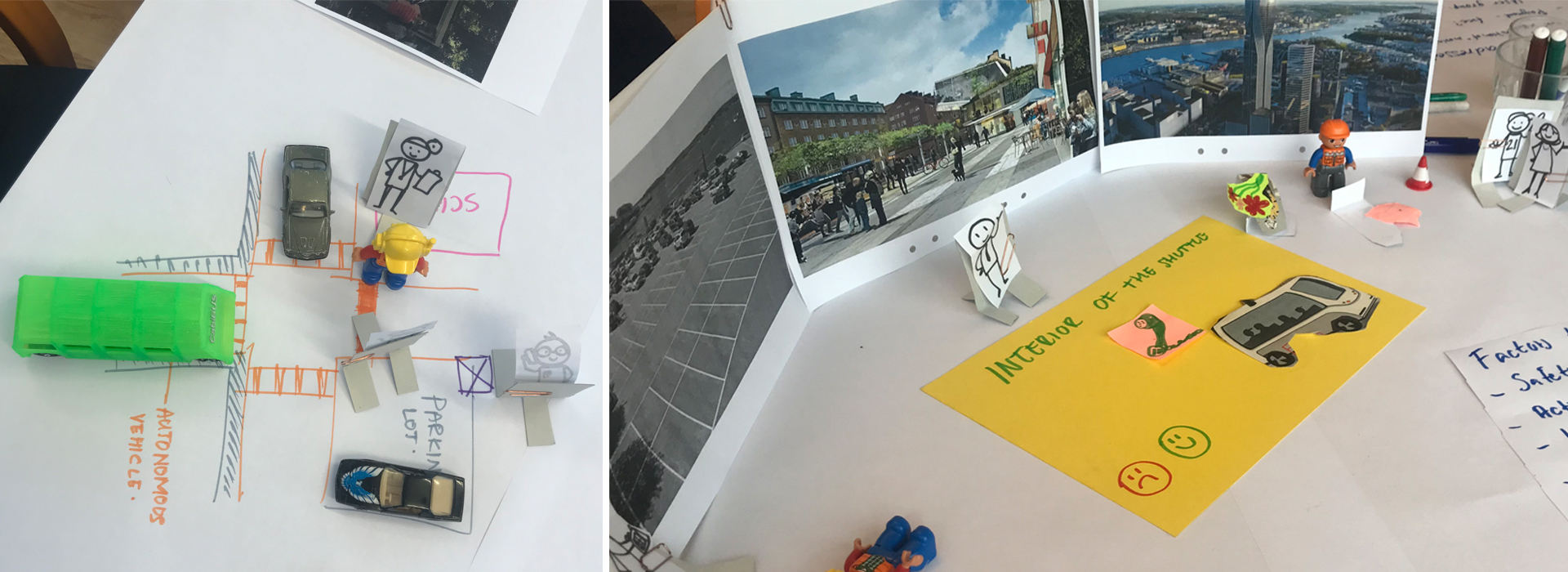AIR workshop: Autonomous systems in industrial environments.
Find out what the researchers have developed within the AIR research environment and meet with peers for a workshop on future research ideas. Warm Welcome, Professor Achim Lilienthal, Coordinator of the AIR project at Örebro University
When: 17th of October, 12:00-17:00 (including lunch)
Where: Fakultetsklubben, Entréhuset, Örebro University
Register to: lina.windh@oru.se no later than 12th of October. Limited seatings available.
This event is hosted by Usify and Örebro University
________________________________________________________________________
 AutoUI Workshop on Methodology: Evaluating Interactions between Automated Vehicles and Other Road Users – What Works in Practice?
AutoUI Workshop on Methodology: Evaluating Interactions between Automated Vehicles and Other Road Users – What Works in Practice?
Methods and metrics for studying interactions between automated vehicles and other road users in their vicinity, including vulnerable road users like pedestrians and cyclists as well as non-automated traffic, are not established yet. This workshop focuses on identifying the strengths and weaknesses of various methodologies that could potentially be used to study such interactions. The objective lies in determining the proper experimental design, sensitivity of metrics for measuring user behavior, ecological validity, generalizability of findings, extraction of insights regarding how findings can be translated into actionable requirements, and the alternatives for conducting longitudinal field studies. It will be of an interactive nature and involve hands-on activities. The workshop will consolidate existing knowledge, identify recurring issues, and explore the path towards resolving these issues. The outcome will be compiled into a paper in order to share this valuable knowledge with a broader research community.
Call for participation
We are pleased to invite you to the Workshop on Methodology: Evaluating Interactions between Automated Vehicles and Other Road Users – What Works in Practice?
The workshop is offered in conjunction with the 10th International Conference on Automotive User Interfaces and Interactive Vehicular Applications (AutoUI 2018).
The workshop will take place on September 23, 2018 at 9 am – 13 pm on the following location:
University of Toronto
Bahen Centre
40 St George St
Toronto M5S 2E4
Important dates
- Position paper deadline: August 6th, 2018
- Notification of acceptance: August 20th, 2018
- Workshop date: September 23rd, 2018
Goal
The workshop will focus on various methodological aspects related to interaction of automated vehicles and other road users ilike pedestrians and cyclists as well as non-automated traffic. The goal is to discuss the best practices aided by pre-determined use cases. The themes include, but are not limited to:
Ecological validity of (controlled) experiments: How can we make sure that the results are scalable and generalizable? Do they also work in the field in the same way? Virtual Reality, Simulator, and Video-based studies: how can we add a more realistic context to our design and research work in laboratories.
Effective measurement of behavioral impact: How can the behavioral impact of an external vehicle interface on other road users be measured? This includes not just behavior, but also the feeling of safety and comfort (both negative and positive impact). Which metrics do we use for such measurements, and how do we ensure that the metrics are sensitive enough? How do we define a “good” interaction, and consequently, what is a “good” external HMI? How can we qualitatively state the effect of an external HMI on road user behavior?
Alternatives for Longitudinal Field Studies: We do not currently have a way to study changes in behavior that might take place over longer periods of time. Given that executing a longitudinal field study is impractical and unrealistic in the short term, what are the alternatives that yield reliable and equivalent insights?
Which methodology for which type of insight: Not all methods are best suited for gaining all kinds of insights. Within the context of behavioral research in regards to automotive interfaces, when is, for instance, video-based ethnographic observation and coding better suited than questionnaire-based responses, specific quantitative measures, and participant interviews? In situations where quantitative and qualitative results don’t align, how do we filter the most critical insights in this context? Before designing and developing concepts for an HMI, we crucially need requirement specifications and identification of user needs. What kinds of methods are required to identify the various use cases and specify the requirements in the first place?
Efficacy of Wizard of Oz setups for studying interactions: Many research questions call for realistic evaluation of pedestrian interactions with autonomous vehicles. Do Wizard of Oz (WOz) setups like offer an optimal solution? Is there a difference between a WOz setup where there is no one in the car, vs. a setup where a “passenger” is clearly engaged in a non-driving activity? Between different runs of experiments involving a WOz setup, how can perfect consistency be ensured?
Participation
The workshop is intended for HCI researchers, practitioners, designers and developers that deal with the interaction of autonomous vehicles with other road users (including vulnerable road users like pedestrians and cyclists, as well as non-autonomous traffic). Workshop candidates have to submit a position paper, see Submission.
The workshop can accommodate a maximum of 30 participants. Applications will be selected by workshop chairs, who will evaluate position papers based on their fit with the workshop theme, their originality, and their quality. The author of an accepted submission must attend the workshop, and register for both the workshop and for at least one day of the AutoUI 2018 conference.
Submission
To ensure a productive workshop, participants are asked to submit a short position paper outlining the following:
- A description of why this workshop is relevant/interesting to the author(s).
- An outline of the research goals that the author(s) want to tackle during the workshop, as well as their expectations.
- (Optional, but highly encouraged) The authors’ prior experience conducting research on interactions between automated vehicles and other road users, including the following:
- The research question that was being investigated.
- The methodology (including metrics) applied to study the behavior.
- The insights gathered regarding what worked and what did not work with the selected methodology.
- Author biographies: A short description of the author’s background.
The position papers should be 1-4 pages (excluding references and bio), in the CHI extended abstract format, and submitted via email to d.dey@tue.nl. Submission should not be anonymous.
The position papers will be reviewed and notifications will be sent out one month prior to the workshop. The papers will be published through the workshop website. Copyright remain with the authors.
Schedule
It is a half-day workshop (9 am – 13 pm) that will last for a total of four hours at University of Toronto:
| 30 min | Introduction to workshop + presentations + summary of the position papers |
| 60 min | Round 1 break-out session: group work on identifying specific methodological issues |
| 15 min | Break |
| 60 min | Round 2 break-out session: group work on continuation of discussions/ resolving the methodological issues identified in Round 1 |
| 60 min | Presentation from each group |
| 15 min | Wrap-up, debriefing, preparation of follow-up for joint publication |
Organizers
Debargha Dey is a researcher and PhD candidate in the department of Industrial Design at Eindhoven University of Technology, Netherlands. He holds a master’s degree in Computer Science and a doctorate degree in Human-Computer Interaction. His research focuses on the human factors of autonomous vehicles (AV), particularly the interaction of AVs with vulnerable road users.
Azra Habibovic is senior researcher at Research Institutes of Sweden (RISE). She holds a PhD in Vehicle Safety Systems (2012) and an MSc in Electrical and Electronics Engineering (2006), both from Chalmers University of Technology, Sweden. Her research focuses on improving traffic safety and user experience by means of automation and connectivity.
Maria Klingegård is a senior research at Research Institutes of Sweden (RISE). She holds a PhD in Information Technology (2010) from Örebro University, Sweden and an MSc in HCI with ergonomics (2004) from University of College London, England. Her research focuses on the human cognition in the interaction with automated vehicles.
Victor Malmsten Lundgren is a researcher at Research Institutes of Sweden (RISE). He has a MSc in Industrial design engineering (2015) from Chalmers University of Technology, Sweden. His research focuses on the human factors of AVs, with especial emphasis on interactions with other road users.
Jonas Andersson is a senior researcher at Research Institutes of Sweden (RISE). He holds a PhD in Human-Technology Design from Chalmers University of Technology. His research interests focus on human-automation systems design and evaluation and the societal benefit of automation in the transportation domain.
Anna Schieben received her diploma degree in Psychology at the Technical University of Braunschweig in 2005. Since then, she works at the Institute of Transportation System at DLR, now as Senior Scientist. She is leading a team of six researchers on Human-Machine interaction since 2013. Her main research interests are the development of user-friendly, easy-to-use and safe interaction design for AVs with a specific focus on design for transitions of control between different automation levels and interaction needs of other road users. She is also coordinating the EU Horizon 2020 project interACT, a project on designing cooperative interaction of AVs with other road users in mixed traffic environments.
Hüseyin Avsar is a senior researcher at the Institute of Transportation System at DLR. He holds a PhD in Human-Computer-Interaction from the University of Nottingham. His research focuses on impact assessment and evaluation of intelligent transportation systems.
Richard Romano is a professor at the University of Leeds Institute for Transport Studies. He holds a PhD in human factors from the University of Iowa. He directs the development of and research on the University of Leeds driving simulator and pedestrian simulator. He is the PI on an Innovate UK funded project to replace HGVs with delivery robots on the high street and a CoI on the European funded interAct project and Innovate UK funded HumanDrive project. Each of these projects have a focus on “humanising” the performance and interactions of AVs.
Contact
If you have any questions, please don’t hesitate to contact us:
Azra Habibovic, azra.habibovic@ri.se
Debargha Dey, d.dey@tue.nl

